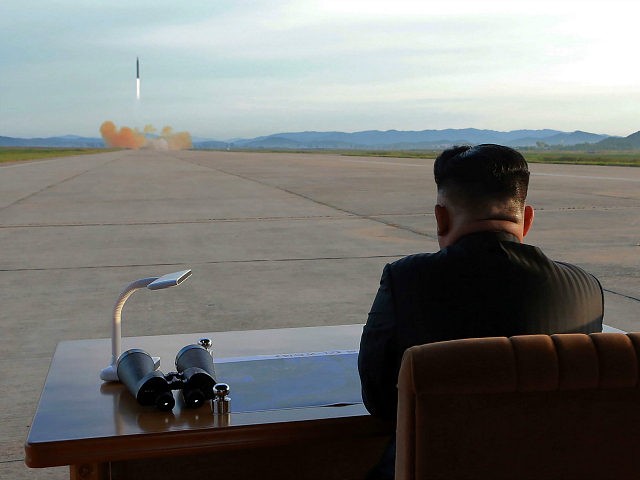The North Korean nuclear crisis has been simmering on the back burner for a surprisingly long time given how tense the situation was over the summer.
It has been over a month since Pyongyang’s last provocative missile launch. Several opportune dates for further provocations have come and gone, from North Korean political holidays to China’s Communist Party congress.
The crisis has not gone away, however. On Sunday, U.S. Joint Chiefs of Staff Chairman Gen. Joseph Dunford hosted a meeting with South Korean and Japanese military officials at the U.S. Pacific Command headquarters in Hawaii. The three powers produced a joint statement calling on North Korea to “refrain from irresponsible provocations that aggravate regional tensions, and to walk away from its destructive and reckless path of development.”
“The leaders focused on trilateral cooperation in Northeast Asia to respond to increasingly provocative actions from North Korean leader Kim Jong Un. The North Korean leader is persisting in developing nuclear weapons and the missile systems to deliver them. He is continuing this effort in the face of nearly universal condemnation and in defiance of a number of United Nations Security Council resolutions,” the Defense Department wrote in its account of the meeting.
Dunford stressed the “ironclad” commitment of the United States to defend South Korea and Japan with “the full spectrum of U.S. military capabilities, including conventional, nuclear, and missile defense assets.”
To that end, Dunford and his opposite numbers Gen. Jeong Kyeong-doo of South Korea and Adm. Katsutoshi Kawano of Japan discussed improving the interoperability of their military forces and joint efforts to defend cyberspace. On a more upbeat note, they also “agreed to explore their collective capabilities in humanitarian assistance and disaster relief.”
South Korea’s opposition party is pushing for even closer, and more controversial, military cooperation with the United States. Hong Joon-pyo, leader of the conservative Liberty Korea party, met with officials in Washington last week to review proposals for bringing U.S. nuclear weapons back to South Korean soil for the first time since 1991.
“We want the tactical nuclear weapons to be redeployed in Korea so that we would have an equal footing and then we will be able to sign a treaty to disarm the nuclear weapons,” Hong explained.
Fox News notes that, while current South Korean President Moon Jae-in is opposed to bringing back U.S. nuclear weapons “for fear it might spark an arms race,” the South Korean public favored the idea by 60 percent in a Gallup poll. Hong would seem to be splitting the difference by asking for American nukes to be returned as a bargaining chip that could lead to genuine bilateral nuclear disarmament on the peninsula, with North Korea presumably feeling increased pressure from China.
Speculation abounds concerning just how exasperated China has become with its unruly North Korean client. One can only imagine how upset Chinese President Xi Jinping would have become if North Korean dictator Kim Jong-un had launched missiles or detonated nuclear bombs during Xi’s ceremonial consolidation of power at the Communist Party congress. Instead, Kim sent Xi a personal note of congratulations and behaved himself.
Secretary of Defense James Mattis made comments from Seoul this weekend that have been widely reported as a warning that North Korea’s nuclear missile threat is “accelerating,” although for what it is worth, he spoke in the past tense: “North Korea has accelerated the threat that it poses to its neighbors and the world through its illegal and unnecessary missile and nuclear weapons programs.”
That sounds less like a warning of imminent mischief from Pyongyang than a summary of how we reached this tense impasse. Mattis was unwavering in warning North Korea that it does not have any military options. “Make no mistake: any attack on the United States or our allies will be defeated, and any use of nuclear weapons by the North will be met with a massive military response that is effective and overwhelming,” he said.
“I cannot imagine a condition under which the United States would accept North Korea as a nuclear power,” the Secretary of Defense declared. President Donald Trump is due to visit the region later this week.

COMMENTS
Please let us know if you're having issues with commenting.